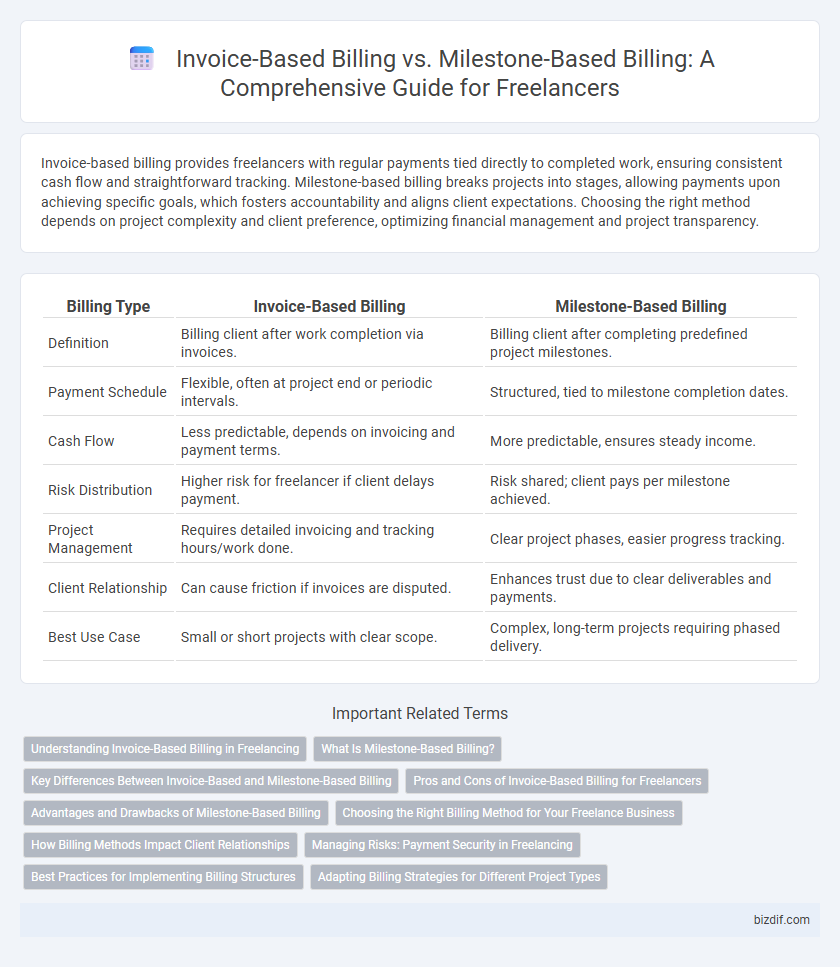Invoice-based billing provides freelancers with regular payments tied directly to completed work, ensuring consistent cash flow and straightforward tracking. Milestone-based billing breaks projects into stages, allowing payments upon achieving specific goals, which fosters accountability and aligns client expectations. Choosing the right method depends on project complexity and client preference, optimizing financial management and project transparency.
Table of Comparison
| Billing Type | Invoice-Based Billing | Milestone-Based Billing |
|---|---|---|
| Definition | Billing client after work completion via invoices. | Billing client after completing predefined project milestones. |
| Payment Schedule | Flexible, often at project end or periodic intervals. | Structured, tied to milestone completion dates. |
| Cash Flow | Less predictable, depends on invoicing and payment terms. | More predictable, ensures steady income. |
| Risk Distribution | Higher risk for freelancer if client delays payment. | Risk shared; client pays per milestone achieved. |
| Project Management | Requires detailed invoicing and tracking hours/work done. | Clear project phases, easier progress tracking. |
| Client Relationship | Can cause friction if invoices are disputed. | Enhances trust due to clear deliverables and payments. |
| Best Use Case | Small or short projects with clear scope. | Complex, long-term projects requiring phased delivery. |
Understanding Invoice-Based Billing in Freelancing
Invoice-based billing in freelancing involves sending clients detailed invoices after completing agreed-upon work or at regular intervals, ensuring transparent tracking of hours and tasks. This method provides flexibility in payment timing and amounts, making it ideal for ongoing projects without defined deliverables. Freelancers benefit from standardized invoicing software that supports timely payments and accurate financial records, enhancing cash flow management.
What Is Milestone-Based Billing?
Milestone-based billing divides a project into specific phases or deliverables, with payments released upon the successful completion of each milestone. This method enhances financial transparency and reduces risk for both freelancers and clients by tying payments directly to progress. It is particularly effective for complex projects requiring ongoing approval and iterative feedback.
Key Differences Between Invoice-Based and Milestone-Based Billing
Invoice-based billing requires freelancers to submit detailed invoices for completed work, allowing flexible payment schedules tied directly to hours worked or tasks finished. Milestone-based billing divides a project into predefined segments, with payments released upon achieving specific deliverables or goals, ensuring structured cash flow and project progress tracking. Key differences include payment timing precision, client-freelancer risk distribution, and the level of project management control each method provides.
Pros and Cons of Invoice-Based Billing for Freelancers
Invoice-based billing offers freelancers straightforward payment terms by invoicing clients for completed work or hours logged, ensuring timely cash flow without waiting for project milestones. However, it may lead to payment delays if clients dispute hours or work quality, and lacks the structured guarantees that milestone-based billing provides. Freelancers benefit from predictable invoicing but face potential challenges in managing client expectations and ensuring prompt payments.
Advantages and Drawbacks of Milestone-Based Billing
Milestone-based billing offers clear payment schedules tied to project progress, improving cash flow management and reducing risks for freelancers by ensuring compensation aligns with delivered work. This method enhances client trust through transparency but can create administrative overhead and potential payment delays if milestones are not clearly defined or agreed upon. Challenges also include negotiating milestone criteria and managing client expectations to avoid disputes over project stages and payouts.
Choosing the Right Billing Method for Your Freelance Business
Invoice-based billing provides flexibility by allowing freelancers to bill clients for completed work or hours logged, making it ideal for ongoing projects or hourly contracts. Milestone-based billing ties payments to specific project deliverables, ensuring clear expectations and secured payments before proceeding, which benefits fixed-scope or phased projects. Selecting the right billing method depends on project complexity, client preferences, and cash flow needs, optimizing financial stability and client satisfaction.
How Billing Methods Impact Client Relationships
Invoice-Based Billing offers freelancers straightforward payment schedules, fostering transparency but may delay client feedback due to lump-sum invoicing. Milestone-Based Billing breaks projects into smaller segments, promoting continuous client engagement and trust through incremental deliverables and payments. Choosing the right billing method directly affects client satisfaction, communication frequency, and the overall partnership dynamics.
Managing Risks: Payment Security in Freelancing
Invoice-based billing exposes freelancers to payment delays and non-payment risks, requiring thorough client vetting and clear payment terms to ensure timely compensation. Milestone-based billing enhances payment security by breaking projects into smaller deliverables, allowing freelancers to receive partial payments before proceeding, thus minimizing financial exposure. Employing escrow services alongside milestone payments further safeguards funds, reducing the likelihood of disputes and enhancing trust between freelancers and clients.
Best Practices for Implementing Billing Structures
Invoice-based billing requires clear documentation of hours worked and deliverables provided, ensuring transparency and timely payment. Milestone-based billing is effective for projects with defined phases, allowing freelancers to receive partial payments upon completion of specific tasks. Implementing clear agreements, setting realistic milestones, and maintaining consistent communication are essential to avoid disputes and improve cash flow management.
Adapting Billing Strategies for Different Project Types
Freelancers optimize cash flow and client satisfaction by choosing invoice-based billing for ongoing or hourly projects, providing flexibility and regular payments. Milestone-based billing suits fixed-scope projects by breaking down payments into clearly defined deliverables, reducing risk and ensuring accountability. Adapting billing strategies to project complexity and client preferences enhances transparency and project management efficiency.
Invoice-Based Billing vs Milestone-Based Billing Infographic

 bizdif.com
bizdif.com